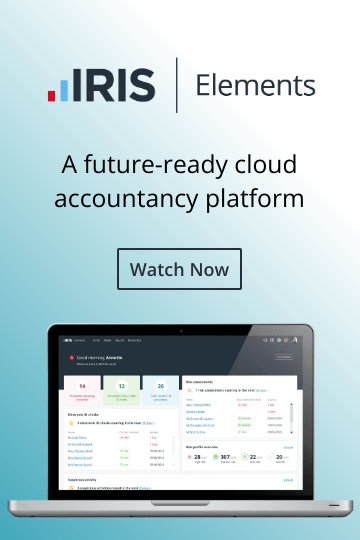BLOGS
Is Artificial Intelligence (AI) the end of accountancy as we know it?

We find ourselves in a period defined by swift technological change, with artificial intelligence (AI) continuing to find its way into all aspects of the working world.
The accountancy industry stands as a pertinent example of this shift.
The ‘Big Four’ are heavily investing in AI, with the recent news that KPMG is joining PWC, Deloitte and EY in investing billions.
However, a resounding fear dominates the industry that AI could be the end of the profession, robotising the industry completely.
Should professionals be worried? Can AI truly meet its sky-high expectations?
Guess what? AI has been used for years!
News for some, while commonplace for others, AI has been used by accountants for some time now.
In the past, audits were reliant on sampling methods; however, AI has ushered in a new era where auditors can run all data digitally through algorithms with audit and AI rules to make sure financial statements portray an accurate and impartial representation.
A distinction that needs making is the excitement we're seeing across social media, which is further compelling the accountancy industry – as well as many others – to further embrace artificial intelligence revolves around generative AI.
Essentially, generative artificial intelligence possesses the capability to craft text, visuals and other forms of media.
An inherent fear of change
The accountancy sector has maintained a historical reluctance towards most technological transformation.
Concepts like cloud software and Making Tax Digital (MTD) to this day face resistance, remaining in nascent stages.
Our recent study revealed a significant insight: 60% of accountants grapple with the challenge of using tech to automate administrative tasks due to budget decision-makers impeding technological investments.
However, accountants aren’t the only ones reluctant to change.
Only 20% of SMEs use a digital solution, and despite all the technologies we’ve seen enter the Gartner Hype Cycle, 80% are still doing things how they used to.
Furthermore, as the media spotlight continues to highlight the downsides of AI, such as potential job displacement and the erosion of a human touch in service-oriented industries, it's understandable that many approach this technology with caution.
As a result, an air of scepticism around AI lingers, and a general resistance to change suggests that significant adoption of AI may be some way off.
What can be done to improve AI adoption?
Ultimately, for AI to receive widespread acceptance, a shift in behaviour, habits and mindset is imperative.
We also need to see greater democratisation of access to technologies.
This is starting to happen, as historically, only the Big four firms used AI, but now, with more tools entering the market, AI is within the reach of the masses.
Additionally, AI being embedded in well-known tools like Microsoft PowerPoint and Adobe goes a long way in adjusting people to the prospect while keeping them in a comfortable environment – showing the potential without causing too much aversion to change.
Yet, while affordability and access might not be as big a factor anymore, there still remains the need to change deep-seated attitudes towards AI to increase adoption.
The starting point? Understanding the benefits.
How can AI benefit accountants?
We can confidently say AI should be viewed as an efficiency tool rather than a complete role replacement.
Despite initial reservations, those open to incorporating AI into their practices can access a plethora of advantages, such as:
- Streamlining time-consuming tasks: AI-driven automation can speed up undertakings like data entry, reconciliations and invoice processing — areas which are prone to human error.
- Enhancing workforce skills: firms could deploy chatbots to assist new starters, providing them with a tool to receive swift responses to routine queries. Should a query delve into complexity, it could be escalated to a human.
- Audio transcription: AIservices can remove the need to take notes during client calls, and message-generating tools can produce content far more quickly than the human hand.
- Unlocking latent expertise: by employing techniques such as pattern matching and trend analysis powered by AI, firms can pinpoint similar clients to their existing roster, paving the way for targeted outreach.
- Elevating training: AI-fuelled training tools could allow you to record and review your verbal presentations and offer feedback – a valuable resource for refining your client-facing pitches.
- Tailored job descriptions: some firms are using AI to create tailor-made job descriptions to ensure they can hire the best talent.
- Improving security: fraud detection is often time-consuming but essential – with AI, you can speed up the process, using technology to identify patterns and anomalies in data.
- Better insights: AI provides access to clients’ real-time financial performance, enabling you to easily make smarter, data-driven decisions.
What are the risks of generative AI?
It's crucial to recognise AI is still in its developmental stages.
As such, there are a few pitfalls to be mindful of.
Particularly, generative AI has gained a reputation for being an authoritative liar, with countless instances emerging where the information produced includes inaccuracies.
In an industry where trust holds paramount importance, unquestioningly accepting AI outputs can pose significant risks to your reputation, credibility and legal responsibility.
However, as generative AI can’t be taken at face value, an additional burden is placed on accountants as they must verify the outputs themselves – something not currently feasible due to the industry being so time-poor.
Furthermore, harnessing the full potential of generative AI necessitates a distinct skill set.
Effectively utilising generative AI hinges on knowing the precise prompts to employ.
Accountants won't glean optimal benefits from the technology without an understanding of these prompts, demanding a certain level of technical proficiency – a luxury not all professionals have the time to cultivate.
Don’t let private data become public
Perhaps the most pressing risk for accountants is that once information is submitted to a public AI tool, the data also becomes public.
A nightmare scenario if a client’s personal tax information was submitted.
“The key risks when using AI or machine learning tools in the deal environment are around data security,” says Stephen Bates, partner at KPMG.
“Accountancy firms need to properly understand the data capture and storage process, the initial and ongoing use of the data, and ownership and protection of that data – especially that it meets legal and regulatory requirements,” Bates says.
The end is… not near
The prospects presented by AI for the future are undeniably thrilling, and it’s only the beginning.
As showcased in Gartner’s Hype Cycle, generative AI still won’t peak/plateau for at least another 5-10 years.
At the moment, the possibilities are endless.
UK accountancy firms that welcome AI integration will secure an advantage in adapting to whatever comes their way and offering elevated client experiences.
Whether one is inclined to accept it or not, AI is simply the next evolution of technology.
Arguably, the biggest risk surrounding AI is not educating accountants about its potential benefits or training them on how to get the best out of it.
I urge firms to upskill existing staff on AI before the next generation of professionals who aren’t trained in accountancy but are trained in using AI to deliver accountancy services arrive.














